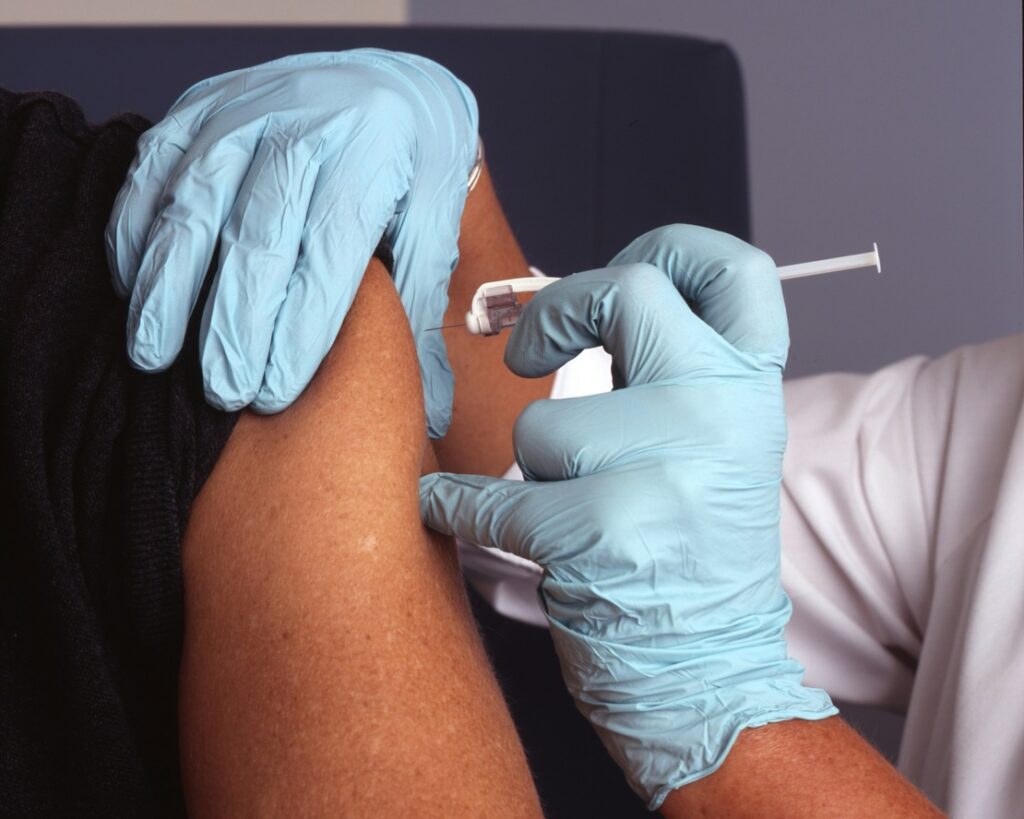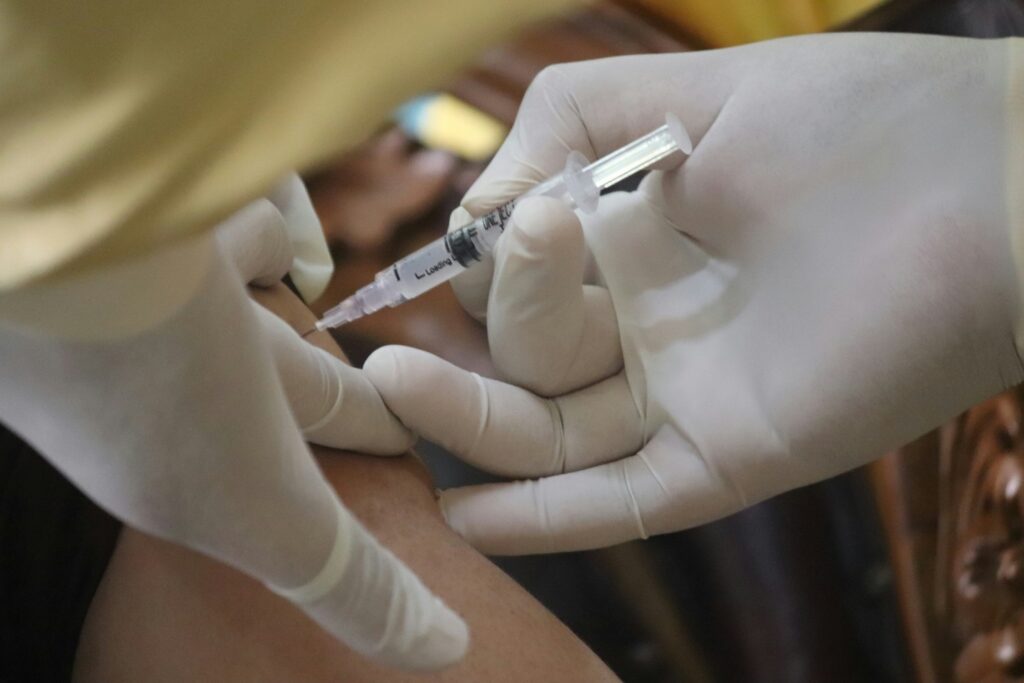Whether you’re exploring bustling cities, relaxing on tropical beaches, or trekking through lush jungles, traveling to new and exciting destinations is one of life’s greatest joys!
But before you pack your bags and set off, there are a few important health precautions to take to ensure your trip is safe and enjoyable. One key measure is making sure your vaccines are all up-to-date.
In this guide, we’ll be taking a look at getting the hepatitis vaccine before travel, why these vaccines are crucial for certain destinations and what side effects to expect.
We’ll also cover which countries require these vaccines, how to get and manage your vaccination certificate, and what to do if you misplace it.
Ready? Let’s get going!

What Is Hepatitis?
Hepatitis is a general term for inflammation of the liver. It can be caused by various factors, including viral infections, alcohol use, certain medications, and underlying medical conditions. The liver is a vital organ that processes nutrients, filters the blood, and fights infections. When the liver becomes inflamed or damaged, its ability to perform these functions is compromised.
Types of Hepatitis
There are several types of hepatitis, but we’ll be looking at hepatitis A and B.
Hepatitis A
Hepatitis A is caused by the hepatitis A virus (HAV), and is usually spread through consuming contaminated food or water.
Hepatitis A is typically an acute, short-term infection and does not lead to chronic liver disease. Symptoms can range from mild to severe and may include fatigue, nausea, abdominal pain, loss of appetite, and jaundice (yellowing of the skin and eyes).
Hepatitis B
Hepatitis B is caused by the hepatitis B virus (HBV) and can be transmitted through contact with infected blood, semen, or other bodily fluids. Unlike hepatitis A, hepatitis B can be both acute and chronic.
Chronic hepatitis B can lead to serious health issues such as liver cirrhosis, liver failure, and liver cancer.
Symptoms of acute hepatitis B are similar to those of hepatitis A, but chronic hepatitis B may be asymptomatic for years.

What Are The Hepatitis A and B Vaccines?
The hepatitis vaccines for travel are designed to combat the different types of hepatitis. Here’s what you need to know.
- Hepatitis A Vaccine: The hepatitis A vaccine is made from an inactivated (killed) form of the hepatitis A virus. It helps the immune system recognize and fight the virus without causing the disease.
- Hepatitis B Vaccine: The hepatitis B vaccine contains a protein called hepatitis B surface antigen (HBsAg), which is produced using recombinant DNA technology. It does not contain a live virus, so it cannot cause the infection.
How They Work
Both vaccines work by stimulating the body’s immune system to produce antibodies against the viruses:
- Hepatitis A Vaccine: When the inactivated virus is introduced into the body, the immune system recognizes it as a threat and produces antibodies. These antibodies remain in the system, ready to attack if the real virus ever enters the body.
- Hepatitis B Vaccine: The hepatitis B surface antigen in the vaccine triggers the immune system to produce antibodies against the hepatitis B virus. These antibodies provide long-term protection by recognizing and neutralizing the virus if it is encountered in the future.
Side Effects
While the hepatitis vaccines are generally safe, there can be some side effects.
Hepatitis A Vaccine
Hepatitis A vaccine side effects include:
- Swelling, tenderness, redness, warmth, or a hard lump where the shot was given
- Low fever
- General ill feeling
- Nausea
- Loss of appetite
- Headache
Hepatitis B vaccine
Hepatitis B vaccine side effects include:
- Pain, soreness, redness, or swelling in the arm where the shot was given
- Headache
- Fever
- Fatigue
- Irritability, diarrhea, loss of appetite in healthy infants and children who received
- Vomiting, crying, drowsiness in children

Countries That Require Hepatitis Vaccines For Travel
Before embarking on international travel, it’s essential to be aware of the health risks associated with your destination. Some countries have a higher prevalence of hepatitis A and B, making vaccination an important part of your travel preparation.
While not all countries require these vaccinations for entry, many recommend them to protect against local health risks.
Here’s a list of countries that require hepatitis vaccines:
Hepatitis A
Hepatitis A is often spread through contaminated food and water, and its prevalence is higher in regions with lower sanitation standards. Travelers to the following regions are strongly advised to get the hepatitis A vaccine:
- Africa
- Asia
- Central America
- South America
- Middle East
- Eastern Europe
Hepatitis B
Hepatitis B is transmitted through contact with infectious blood and bodily fluids. It’s prevalent in areas where the virus is common and medical facilities may lack strict hygiene protocols. The hepatitis B vaccine is recommended for travelers to:
- Africa
- Asia
- Eastern Europe
- Pacific Islands
- South America
If you’re unsure, you can always take a look at this list from the Center for Disease Control (CDC).

Getting Your Vaccination Certificate
After receiving your hepatitis A and B vaccines, it’s important to obtain an official vaccination certificate. This document serves as proof of your immunization and may be required for entry into certain countries or for specific activities. Here’s a quick breakdown:
- Visit a Certified Healthcare Provider: Ensure that you receive your vaccines from a certified healthcare provider, such as a travel clinic, hospital, or doctor’s office. These providers can issue valid vaccination certificates.
- Ask for the Certificate: After your vaccination, request a certificate that includes the following information:
- Your full name and date of birth
- The name and batch number of the vaccine(s) administered
- The date(s) of vaccination
- The healthcare provider’s name, signature, and contact information
- An official stamp or seal from the issuing clinic or healthcare provider
- Digital Certificates: Some healthcare providers and clinics offer digital vaccination certificates. These can be stored on your smartphone or printed out as needed. Ensure the digital certificate contains all necessary information and is recognized by authorities.
Managing Your Vaccination Certificate
Properly managing your vaccination certificate is crucial to ensure it remains valid and accessible when needed. Here’s what you need to know:
- Keep it Safe: Store your physical vaccination certificate in a secure and easily accessible place, such as a travel document organizer or a dedicated folder.
- Make Copies: Photocopy or scan your vaccination certificate and keep a digital copy on your phone or in cloud storage. This provides a backup in case the original is lost or damaged.
- Update Regularly: If you receive booster shots or additional vaccines, ensure your certificate is updated accordingly. This can be done at the same healthcare provider where you received your initial vaccination.
- Carry it When Traveling: Always carry your vaccination certificate with your travel documents, especially when traveling to countries that require proof of vaccination for entry.
What Happens If You Misplace It
Losing your vaccination certificate can be stressful, but there are steps you can take to replace it:
- Contact the Issuing Healthcare Provider: Reach out to the clinic or healthcare provider where you received your vaccine. They typically keep records and can issue a replacement certificate.
- Check Digital Records: If you have a digital copy of your vaccination certificate, print it out and ensure it includes all required details. Many health authorities now accept digital records.
- Consult National Health Databases: Some countries maintain national immunization registries. Check if your vaccination records are stored in such a database and request a copy.
- Visit a Travel Clinic: If you are unable to retrieve your certificate from the original provider, a travel clinic may assist in verifying your vaccination status and issuing a new certificate.
- Document Your Vaccinations: Keep a personal record of all vaccinations, including dates, vaccine names, and healthcare provider details. This information can help healthcare providers recreate your vaccination history if needed.

When To Get The Hepatitis Vaccines For Travel
Proper timing of your hepatitis A and B vaccinations is crucial to ensure you are fully protected before your trip. The vaccines need time to become effective, so planning ahead is essential.
According to the Superdrug Health Clinic, the hepatitis A and B vaccines should be given 5 weeks before jetting off.
Final Thoughts
Getting your vaccines is always a good idea. But hiccups still occur. If something does happen, you can always use the Air Doctor app.
With the Air Doctor app in your pocket, you can access medical advice, get prescriptions, and receive expert medical guidance wherever you are in the world!
Air Doctor’s easy-to-use app gives you:
- A global network of over 20,000 multi-lingual doctors and specialists
- Choice of clinic, at-home (hotel), and video consultations
- Active in 78 countries
- Cross border prescription services
- Video consultation services in up to 21 languages and 84 countries
- 24/7 multi-lingual support
- Transparent pricing, and reviews
- Most common medical specialties












